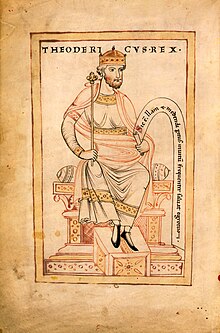Theodericus
Jump to navigation
Jump to search
Latin
[edit]Theodericus Rex: King Theoderic the Great of the Ostrogoths, the Goth who became the second Germanic King of the Kingdom of Italy, and a map of his united Gothic realms which grew to span a significant portion of the former western (Latin) Roman Empire in the 5th-6th centuries AD.
Alternative forms
[edit]- Teodericus, Theoderichus, Theodorichus, Theodoricus, Theuderichus, Theudericus
- Theuderedus, Theuder, Theodor, Deudorix, Deudoricus
Etymology
[edit]From a Germanic origin likely via Gothic *𐌸𐌹𐌿𐌳𐌰𐍂𐌴𐌹𐌺𐍃 (*þiudareiks), from Proto-Germanic *Þeudarīks (from *þeudō (“people”) + *rīks (“king”)). Etymologically unrelated to Latin Theodōrus from Ancient Greek Θεόδωρος (Theódōros, “Theodore”, literally “gift of God”), although medieval conflation of the Germanic and Hellenic names may have given rise to Byzantine Greek Θεοδώριχος (Theodṓrikhos, “Theodoric”), Late Latin Theodōrīchus (“Theodoric”).
Pronunciation
[edit]- (Classical Latin) IPA(key): /tʰe.oˈde.ri.kus/, [t̪ʰeɔˈd̪ɛrɪkʊs̠]
- (modern Italianate Ecclesiastical) IPA(key): /te.oˈde.ri.kus/, [t̪eoˈd̪ɛːrikus]
Proper noun
[edit]Theodericus m sg (genitive Theodericī); second declension (Late Latin, Medieval Latin)
- a male given name from Gothic, equivalent to Koine Greek Θευδέριχος (Theudérikhos) or English Theoderic, Theodoric, or Derek; variant form Theodōrīcus
- A male given name of historical usage, notably borne by Flāvius Theodericus Magnus (Theoderic the Great) (c. 454–526 C.E.), King of the Ostrogoths (from 475), of the Ostrogothic Kingdom of Italy (from 493), and of the Visigoths (from 511)
- A male given name of historical usage, notably borne by Theodoric I (c. 390–451 C.E.), King of the Visigothic Kingdom from 418 to 451
- A male given name of historical usage, notably borne by Theodoric II (c. 426–466 C.E.), King of the Visigothic Kingdom from 453 to 466
Declension
[edit]Second-declension noun, singular only.
| singular | |
|---|---|
| nominative | Theodericus |
| genitive | Theodericī |
| dative | Theodericō |
| accusative | Theodericum |
| ablative | Theodericō |
| vocative | Theoderice |
Derived terms
[edit]Descendants
[edit]Descendants
(many Romance descendants are learned)
- Vulgar Latin: Deudoricus, Deudorix, Deuterius
- Medieval Latin: Diedericus
- Aragonese: Teodorico
- Asturian: Teodoricu
- → Byzantine Greek: Θευδέριχος (Theudérikhos)
- Greek: Θεοδώριχος (Theodórichos)
- → Russian: Теодо́рих (Teodórix)
- → Ukrainian: Теодо́ріх (Teodórix)
- → Basque: Teodoriko
- Catalan: Teodoric
- → Esperanto: Teoderiko, Teodoriko
- → Estonian: Theoderich
- → Finnish: Teoderik, Theoderik
- → Old French: Theuderich, Theutric
- Galician: Teoderico, ⇒ Toiriz
- → German: Theoderich
- Occitan: Teodoric
- Italian: Teodorico
- Lombard: Teodorico
- → Polish: Teodoryk
- Portuguese: Teodorico
- Romanian: Theodoric
- Sicilian: Tiuduricu
- → Slovene: Teoderik
- Spanish: Teodorico
Further reading
[edit]- Theodericus in Gaffiot, Félix (1934) Dictionnaire illustré latin-français, Hachette, page 1568.
- Theodericus in Georges, Karl Ernst, Georges, Heinrich (1913–1918) Ausführliches lateinisch-deutsches Handwörterbuch, 8th edition, volume 2, Hahnsche Buchhandlung, column 3104
- Theodericus in Charles du Fresne du Cange’s Glossarium Mediæ et Infimæ Latinitatis (augmented edition with additions by D. P. Carpenterius, Adelungius and others, edited by Léopold Favre, 1883–1887)
Categories:
- Latin terms derived from Proto-Indo-European
- Latin terms derived from the Proto-Indo-European root *h₃reǵ-
- Latin terms derived from Germanic languages
- Latin terms borrowed from Gothic
- Latin terms derived from Gothic
- Latin terms derived from Proto-Germanic
- Latin 5-syllable words
- Latin terms with IPA pronunciation
- Latin lemmas
- Latin proper nouns
- Latin second declension nouns
- Latin masculine nouns in the second declension
- Latin masculine nouns
- Late Latin
- Medieval Latin
- Latin given names
- Latin male given names
- Latin male given names from Gothic
- la:Individuals
- la:Historiography


